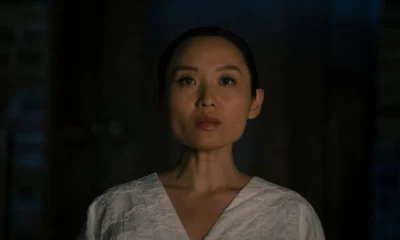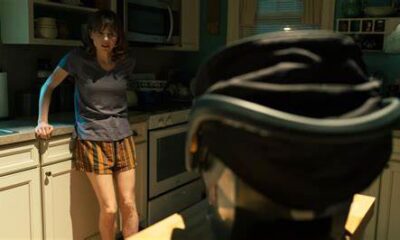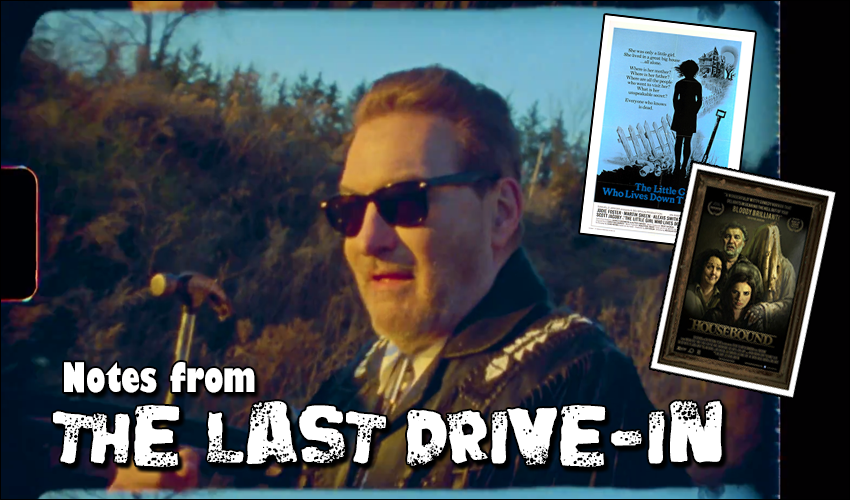
Notes from the Last Drive-In: S4E3 – ‘The Little Girl Who Lives Down the Lane’ and ‘Housebound’
We head back to the drive-in with Joe Bob and Darcy this week to watch The Little Girl Who Lives Down the Lane (1976) and Housebound (2014). Lock your doors and stay inside with Shudder, because this Friday the 13th double-feature is agoraphobic-approved.
We pick up from last week’s Walpurgisnacht fun to another creepy day for horror nerds, and along the way, we learn some cool history about superstition. But does the theme land, or does this week’s double-feature premise feel a little thin?
The Little Girl Who Lives Down the Lane (1976)
The Little Girl Who Lives Down the Lane is a 1972 “cross-genre” film with elements of a teen drama, thriller, horror, and character study. It is certainly no feel-good film, either. It is a dark satire of the worst fears of parents subverted by a protagonist who has lived more than most adults. Directed by Nicolas Gessner, the film stars Jodie Foster, Martin Sheen, Alexis Smith, Mort Shuman, and Scott Jacoby. The film is a Canada/French-produced adaptation of Laird Koenig’s novel of the same name. The film would be written by Koenig.
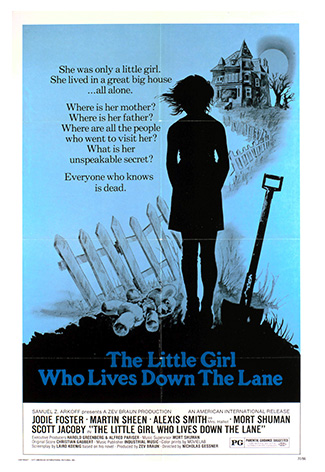
The plot is simple; a thirteen-year-old girl named Rynn (Jodie Foster) lives in apparent isolation in the town of Wells Harbor, Maine. Her apparent isolation draws the curiosity of the community, including that of a local pedophile, Frank (Martin Sheen), the son of Rynn’s landlord, Cora (Alexis Smith). Rynn’s privacy is repeatedly under assault by the larger community and the obsession of Frank as her father, a poet, is never seen by locals. A chance encounter with a young man, Mario (Scott Jacoby), nephew of local cop Ron (Mort Shuman), unravels the complicated and tragic circumstances behind Rynn’s apparent isolation.
This is not a pleasant film, not in the sense that it is not a good film, but in the sense the mood is oppressive and the world depicted is cruel and unfair. The film frustrated me several times because of what liberties adults take against a child in her own home, against her wishes. The writing in this regard is excellent, with several great moments of conversation. This is one of the “talkiest” films shown on The Last Drive-In, perhaps akin to The Changeling. The film itself is limited in scope as well, mostly playing out within Rynn’s house. The story’s limitations reveal the intent of Koenig, the writer, who originally sought to adapt his novel into a play. I would love to live in a world where The Little Girl Who Lives Down the Lane was a theater staple.
The film is tightly written with a fairly efficient run time, though two montages cause the film to drag a bit. This is also compounded by the use of Chopin’s piano concerto No. 1 in E Minor, as performed by pianist Claudio Arrau and The London Philharmonic Orchestra. Chopin’s composition overpowers the film score by Mort Shuman and Christian Gaubert. It feels odd to say, but the use of Chopin seems a little much and is used so frequently that having repeated through montages makes them feel longer due to simple aural repetition.
The film’s cinematography is fine, but René Verzier’s work does not do much to sell the film as needing a film adaptation. The quality and the cinematography are fairly rote. Most of the tension comes from performances with little added effect from Verzier’s camera.
The performances are largely excellent, and the critical praise of Jodie Foster, who was twelve as the production began and then turned thirteen during, is well deserved. Foster is one of the finest actresses to ever work in film and seeing her command the screen so readily is impressive. You feel anxiety for her and can’t help but feel broken at the end of the movie because of how wonderful she is.
Sheen is a revelation as well, only three years away from the role that would cement him as Hollywood royalty in Apocalypse Now. Frank as a character is so manic and aggressive in such a weirdly charismatic way. Imagine the worst person in the world with leading man looks and charm, and you get a sense of just how insidious and dangerous the character of Frank is. The truth is, we are lucky to see such a top-tier actor play such a horrific character.
Now, singing the praises of Foster and Sheen is not to say the rest of the cast does not deliver. Alexis Smith’s Core Hallet is an icy busybody who takes her sparring with a child personally, and her brief time in the film results in wonderful dialogue with Foster’s Rynn. Scott Jacoby plays the handsome and charismatic weirdo, Mario, who creates a bright spot in the overall dark life of Rynn. And not least, Mort Shuman’s Officer Ron Migliorti represents a gentle, good man who tries to help but is kept at arm’s length.
Joe Bob-servations on The Little Girl Who Lives Down the Lane
Joe Bob’s host segments were a lot of fun this week, especially with the recurring discussion on superstition. Perhaps the best of the night came early when he discussed the origins of The Thirteen Club. The whole history was quite fascinating, but also gave way to one of the best laughs of the night: when he cracked a joke about everyone in the club dying, catching Darcy off-guard. The whole night was filled with interesting little asides into the superstitious mind.
Regarding the film, Joe Bob was quite effusive with his praise, as the film deserves. Of the various aspects, he discussed, however, he was particularly vocal about how this film was very much lucky to cast who it had and the time it was made. You get the sense that maybe The Little Girl Who Lives Down the Lane couldn’t be made today and have quite the impact it did with the one-two punch of Foster and Sheen. Regarding Foster, Joe Bob made a very important point: by the time she was twelve she had already had a strong career as a child actress, so her professionalism in the film isn’t overly surprising as some make it out to be.
Final Thoughts on The Little Girl Who Lives Down the Lane
The Little Girl Who Lives Down the Lane is a largely excellent film, among some of the best of the ‘serious’ films that have been shown on the show. The nature of the film as being like that of a play may limit the audience a bit, given how dialogue-heavy it is, but for those who can manage there is a lot to love.
The film does drag at times given the overly artsy montages set to classic Chopin compositions, and the internal logic does frustrate at times given the number of privacy and property violations that seem to occur over the duration of the film. It gives one the impression that maybe the oppressiveness is a more heightened element than was necessarily true. It does certainly inspire a reaction, however. As I was not alive in the 1970s I would love to know the accuracy of how the characters would have behaved from someone who was.
Joe Bob gave the film 3 and 1/2 stars, which seems about right. I feel that perhaps the half-a-star deduction was due to the arthouse quality, as this is a drive-in show. Mutants can only go sophisticate for so long a stretch. As for me, I’d about where Joe Bob is regarding my assessment, giving the film 4 and 1/2 Cthulhus out of 5.
 (4.5 / 5)
(4.5 / 5)
Best Line: “School is having people tell you what life is and never finding out by yourself.” – Rynn
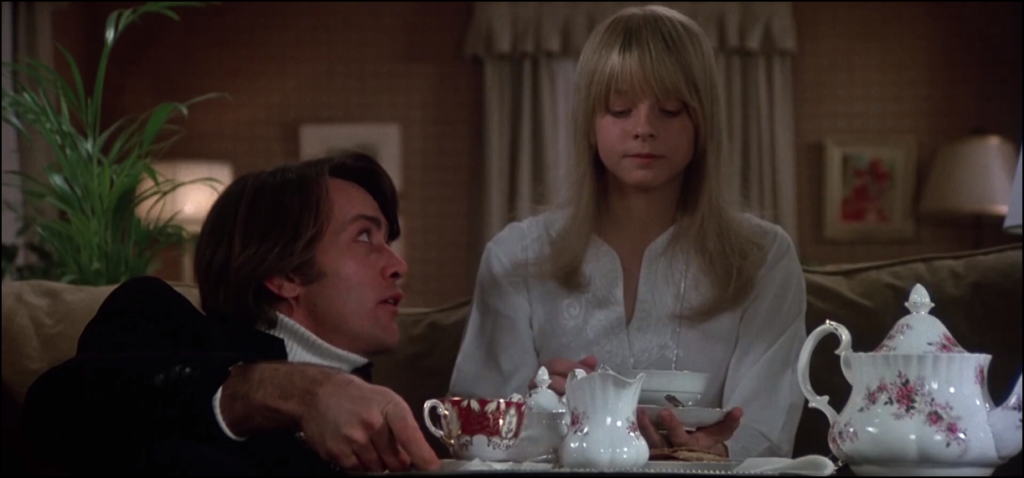
Housebound (2014)
Housebound was the night’s second feature. This 2014 New Zealand horror comedy was written, edited, and directed by Gerard Johnstone. The film made its debut at SXSW where it quickly became an indie darling. The film was a New Zealand accelerator project where government funding was granted in order to assist in the production. The film stars Morgana O’Reilly, Rima Te Wiata, Glen-Paul Waru, and Cameron Rhodes.
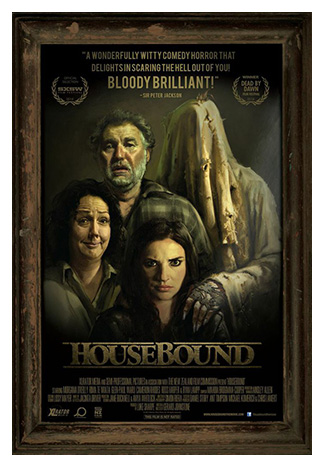
Housebound follows a troubled young woman, Kylie Bucknell (Morgana O’Reilly), who botches an ATM robbery and is sentenced to house arrest for eight months under the care of her mother, Miriam (Rima Te Wiata). Stuck at home with an ankle monitor, Kylie and her mother discuss past instances of hauntings that seem to trigger an awareness of strange things going on within the house. However, Kylie uncovers more about the strange circumstances of the home with the aid of her parole officer, an amateur paranormal investigator, Amos (Glen-Paul Waru), and the guidance of her psychologist, Dennis (Cameron Rhodes).
The film is quite funny but is fairly light on the scares and gore, despite a particularly explosive death that results in a shower of blood. The film was quite critically appraised at the time of release and made waves in the American film industry, but today you do not hear much about it, nor do you hear much about the man behind it, Gerard Johnstone. Indeed, the film seems largely forgotten, which is a bit of a shame given the fresh approach it takes, but also a bit expected in that it doesn’t quite land the punches it throws.
The film’s approach to subverting the haunted house theme is clever at first until contrivances and dialogue dumps begin to drag down what started as a rather tight little haunted house project. The foundation that was so strong progressively begins to look like a tower of Jenga blocks the further on the film goes and the revelation within are clever, but I struggle to say they’re necessarily worth the ride. For example, the Teddy Ruxpin knock-off makes absolutely no sense in the context of the film when all is revealed. Having seen the film twice I am still failing to understand why the bear was able to do what it did, even if it had a “helping hand.” This may be one of the most glaring issues with the logic of the film, in my opinion. That being said, the film has a number of them.
My other big criticism of the film is that the protagonist is unlikeable. A protagonist does not need to be likable to be compelling, but there needs to be some reason to want to follow their journey. I think Morgana O’Reilly is fine as Kylie, but Kylie is such a shit that it is largely hard to root for her. Nor does there seem to be a real sense of growth in her character either as most of the decisions in the final act are largely driven by survival impulses and leave little room for a sense of growth. Rather, the film’s most appealing characters are Amos and Miriam. Amos because he is a weird, earnest dude, and Miriam because Rima Te Wiata does a fantastic job playing a mother abused by her child.
Simon Riera’s cinematography is effective, but nothing particularly outstanding. It is serviceable for the type of film this is. There is a fun moment where Dennis is menaced by the ‘spirit’ of the house and the sequence set across an entirely blacked screen flashes to a chilling reveal of the spirit hovering over the psychologist. A scene involving dentures is also suitably framed to be as uncomfortable as possible, which I appreciate as someone who has a particular fascination with teeth as a vehicle for horror. As for Mahuia Bridgman-Cooper’s score, I found it to be effective, but nothing that really pulled me in, either.
Ultimately, I think the description of “effective but did not pull me in” is an encapsulation of my overall attitude regarding this film. It was, for lack of a better word, fine.
Joe Bob-servations on Housebound
The survey of superstitious carried on into the second film of the night with digressions into rabbits’ feet and the potential origins of the term “knock on wood.” What felt lacking was a real example of the connection of either film to superstition. The connective tissue was the idea of refusing to leave the house, but neither film presented the shut-in nature of their leads as being tied to superstitious anxieties.
Of course, with any New Zealand-sourced film on the show, Joe Bob returns to beating his drum on the misappropriation of the terminology “Kiwi horror” as it relates to the film in question, just as he did back with Deathgasm. In case you missed it with previous horror films out of New Zealand on the show… “Kiwi horror” does not exist – it is not a distinct genre, it is just a label attached to films made out of New Zealand with incubator money during a period of time and there is nothing particularly of New Zealand about them.
Expect to hear that same point again the next time a movie from New Zealand is shown.
Final Thoughts on Housebound
Housebound is a fun mid-2010s horror film out of New Zealand with a clever play on the haunted house trope, but cleverness isn’t enough to win me over completely. Between a thoroughly unsympathetic protagonist, an overly convoluted series of backstory reveals, and the fairly limited amount of horror, I would be hard-pressed to claim this among my favorite on The Last Drive-In. I didn’t really feel a sense of shock or dread. Granted, I was entertained, but the film didn’t blow my mind. The same can’t be said for one of the characters, that’s for sure.
Joe Bob gave the film the 2 and 1/2 stars treatment. I think that is entirely reasonable. It’s worth a watch, but it doesn’t seem like one that will stick with me and other Mutants of my ilk. As for my assessment, I would give it 3 Cthulhus out of 5.
 (3 / 5)
(3 / 5)
Best Line: “You cannot punch ectoplasm.” – Amos
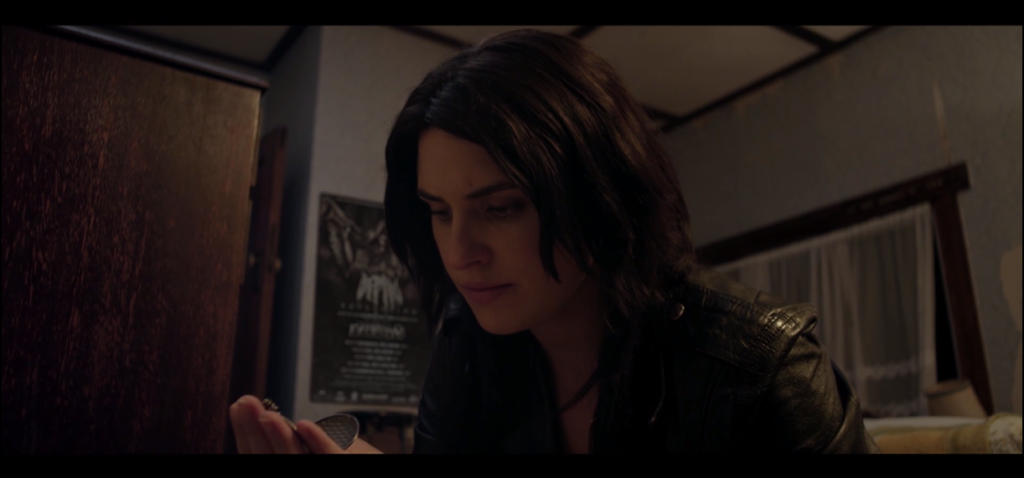
Haunted MTL Drive-In Totals
As for the official drive-in totals, we have the following.
We also have the Haunted MTL Drive-In totals…
- 1 Fangoria Chainsaw Award for Achievement in Non-Fiction
- 1 Dead Hamster
- 2 Moody Montages
- 3 instances of “Thee-ate-er”
- Clipboard Fumbling
- Superstition Tempting
- Heaven Joking
- Cocktail Joking
- Gratuitous Plot
- Gratuitous “Hello Moto”
- Child Rights Advocating
- Water Moccasin Anxiety
- Suprise Italian Racism
- John Brennan Musical Number
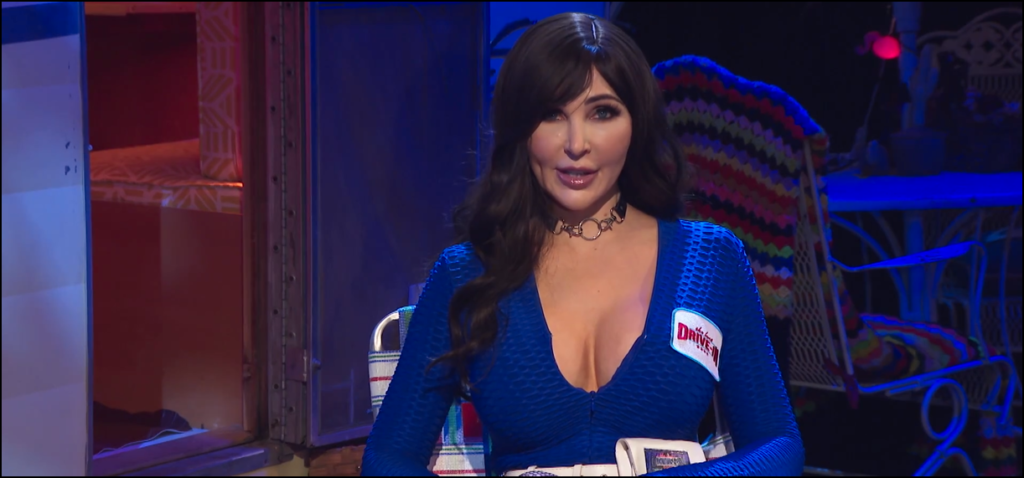
Episode Score for The Last Drive-In: S4E3 – The Little Girl Who Lives Down the Lane and Housebound
I had expressed some doubt about the theme of last week’s double feature, but I am happy to say this double feature’s theme was much more coherent, although admittedly a bit of a stretch. Friday the 13th is a day about superstition, and while that thread was woven in quite well through the host segments, the film selections were tangential – built around the idea of a “shut-in night” for the ultra-paranoid and superstitious.
The only problem was that neither film really dealt with being shut-in due to superstition. One was a girl living by herself trying to do her own thing as the world pushed back at her and the other is about someone under house arrest. The host segments were fun, but I am wondering if stating a theme outright is the right route to go down with these episodes. Perhaps if the themes were stated as being more open-ended the double features would gel a bit better through juxtaposition. However, setting an expectation of a theme and not really delivering on it feels like a misstep.
I am probably taking this sort of thing a bit too seriously, but I also think the past two weeks represent a stretch that could lead to misfires in the future. I vastly prefer the themes of the double features being more subtle or interpretative outside of the holiday sets. Soon we’ll find ourselves seeing an environmental awareness pairing where one film is set in the woods and one film has a beach… and that is about it.
The episode as a whole is still great, of course, and the host segments are as fun as ever. Yet, something about the loose associations between the last four films is rubbing me the wrong way.
 (4 / 5)
(4 / 5)
And that is it for Notes from the Last Drive-In this week. This has certainly been a little bit more critical than most of the reviews I’ve done, owing largely to the fact that the show is usually firing on all cylinders the majority of the time. Four seasons and multiple holiday marathons in, however, it would make sense that maybe there are some performance issues to be aware of.
What did you think, though? Why not share your thoughts in the comments with us about the show and the two films shown. Did you have a favorite?
With that, please join us on Twitter next Friday as we live-tweet with the rest of the Mutant Fam during The Last Drive-In with Joe Bob Briggs.
Love the movie? (Sponsored Link)
Consider purchasing a copy of The Little Girl Who Lives Down the Lane from Amazon. Your purchase through our sponsored link helps Haunted MTL.
Movies n TV
Wheel of Time A Question of Crimson Is a Political Espionage Delight
Episode two of Wheel of Time felt like the beginning of a long journey. Stories are unfolding, lives are changing, and blood is spilling.
Let’s discuss.
The story
We begin this episode in the past with Elayne’s mother, Queen Morgase. It turns out her rise to the throne was a bit, shall we say, cutthroat. So when she shows up at the White Tower, Siuan is concerned.
She might have reason to be, too.
Meanwhile, Rand, Egwene, Moiraine, Lan and Aviendha are in the Spine of The World. As they travel through some of the most breathtaking lands I have ever seen on a TV show, Egwene is plagued with nightmares. We think at first that’s just her trauma working itself through her system. But we soon find out that it might not be that straightforward.
Finally, Perrin returns home to heal after his hand is almost cut in half. But when he gets there he finds the town has been infested by Children of The Light. And they’re looking for him.
What worked
There was something heartwarming in this episode about political espionage and choking religious persecution. And that is Elayne’s relationship with her family.
I have consumed a lot of fantasy content with royal families. And I have never once heard a princess call her mother ‘Mum’. I’ve never seen royal siblings get along. And I have sure as hell never seen a princess have a good relationship with her step-parent.
This was refreshing. Even though Queen Morgase is kind of a horrible person she seems like a good mother. And that’s an unexpected delight.

Of course, this is just one storyline among many. And while this can sometimes be overwhelming, in this case it wasn’t.
I’ll be honest, some of these storylines are going to drag for me. I know this because I’ve read some of the Wheel of Time books and I have an idea that not all the characters exactly pique my interest.
No one likes all the characters. No one likes all the storylines. While I am here for the political espionage between Queen Morgase and Siuan, not everyone likes it. While others might be fascinated with Selene trying to win Rand back, I couldn’t care less.
Having multiple storylines keeps everyone’s attention better. So long as things don’t get out of hand. Things can easily get out of hand. But this seems to be managed well.
So far.
What didn’t work
As I mentioned above, I’m not thrilled with Rand’s story at this point. And while it’s fine to not like a storyline when there are this many to choose from, it’s not fantastic that the one I like the least is the one involving our two main characters. And anytime we were with the team at the Spine of The World, the only thing that brought me joy was Moirain’s hat. It reminded me of Stockard Channing’s hat in Practical Magic.
The problem is that Rand is Charlie Brown with controversial magical powers. He is boring, serious, and pessimistic.
And yes, I understand that he has a heavy emotional burden and he’s the Dragon Reborn and that’s quite taxing and all. But let’s be fair, there isn’t a single person in this show that doesn’t have a heavy burden. And most of them manage to be fun occasionally.

All that being said, this episode of Wheel of Time did exactly what it needed to do. It set up conflicts at each of the three locations. It established emotional ties between the characters and the events. And it established goals for everyone.
This was, in short, a solid episode. Not groundbreaking, not mind-blowing or life changing. It was simply good. It was entertaining and moved the plot forward.
Well done.
 (3.5 / 5)
(3.5 / 5)
Movies n TV
Wheel of Time Returns With A Bang
Wheel of Time is back for season three. There are mixed feelings regarding this. Last season, there were some serious pacing issues. And some serious sticking to the book’s storyline issues. But we’re two seasons in, and we don’t give up so easily. So let’s dive into episode one, To Race the Shadow.
By the way, I highly recommend watching this episode with the subtitles on. You’ll see why.
The story
We begin this episode with Liandrin facing a trial of sorts for her rampant betrayal. She does her best to gaslight her Aes Sedai sisters into thinking that Siuan Sanche is the real traitor.

When that doesn’t work, she reveals how many Black Aes Sedai have actually infiltrated the tower.
Spoiler, it’s a lot.
In the aftermath, our whole team gathers to drink and enjoy one night of relaxation before they head out to the Tear to form an army for Rand. All is going well until they’re attacked by myriad creatures and a sentient axe.
What worked
This episode was long. It had a run time of an hour and eleven minutes. And a lot of that run time was spent in heavy dialog scenes.
Fortunately, these were well-done scenes.
If you’re going to have a lot of talking scenes, there are good ways and bad ways to do it. Last season, we saw lots of examples of the bad way to do it. But this episode did it well. For one thing, other things were going on while conversations were taking place. The characters are drinking, playing games, walking through an interesting city. And the scenes themselves didn’t stretch out. They weren’t repetitive. We heard what the character had to say, then we moved on.
It was also nice that the point of these scenes wasn’t just info dumps. We had character development. We had romantic interactions. We had plot development and foreshadowing.
Overall, this episode felt like what it was. A moment of calm before a storm.
Taking a step back, I’d be remiss if I didn’t address the fight scene at the start of the episode. Because it was epic.
The magic looked amazing. The martial arts that went along with it looked fantastic. The costumes were beautiful. It was just incredibly fun to watch.
More than that, it was emotional. We lost some characters in that fight that were important. And it was clearly emotionally shattering for many of our characters, who found themselves betrayed by people they trusted.
So many of them.
It was a great way to open the season.
What didn’t work
Despite that, this episode wasn’t without its flaws.
First off, there were a lot of dialog scenes. And they were good scenes, as I’ve already discussed. But it was one after another after another. And when your episode is, again, an hour and eleven minutes, it’s maybe a little much to have so much chit-chat. Couldn’t some of these conversations, important as they were, have been moved to maybe another episode?
Finally, I want to talk about Egwene’s travel through the arches.

I feel like maybe there were some deleted scenes here. Because there must have been more to that visit than what we saw, right?
We could have seen Egwene battle Rand. That would have been badass and emotionally devastating. We could have seen her with a quiet life with Rand back home at the Two Rivers. We could have seen anything except for the quick clip of Rand in a bloody river, followed by Egwene being shoved back out in a bloody shift.
No products found.
Bad job. But at least it wasn’t an extended scene of Moiraine collecting bathwater, and then taking a bath while looking sad. If we’d started this season with another scene like that, it might have broken my brain.
Amazon dropped the first three episodes at once. So we’ll be back soon to talk about episode two. See you then.
 (4 / 5)
(4 / 5)
Movies n TV
Entertaining as hell: Eight Legged Freaks (2002) Review
Early 2000s is a special era for the industry. It accepts the cheesiness and corniness of movie making, in turn producing some gems in their own right. Eight Legged Freaks starring David Arquette and young Scarlet Johanson is a horror comedy about giant spiders who overtake a small town. As crazy as that premise sounds, the movie surprisingly has a ton of heart and is super entertaining. Let’s review, shall we?
Plot
We start Eight Legged Freaks with a shot of toxic waste spilling into the water supply of Joshua, a spider farm owner. He is friends with Mike, one of our protagonists, who is a science geek and a spider enthusiast. Mike notices something quite right upon visiting Joshua, but no one takes him seriously. We are then introduced to the rest of the crew. Mike’s mother Samantha, the town sheriff, is too busy chasing Ashley, his sister, who is dating the town mayor’s son Bret (something Samantha does not approve of). We also have Chris, who returns to the town to save his father’s legacy in the town mines. He has opposition from Wade, Bret’s father, who wants to use the mines for his business ventures. Lots of drama going on that will only get juicier once the spiders get loose.
The creepy crawlies quickly dispose of Joshua and make their grand appearance after Ashley rejects Bret’s advances, abandoning him in the middle of a desert. A glorious chase sequence ensues as the spiders make their way towards the town, wreaking havoc on its residents. In a true horror fashion (which the movie acknowledges), it takes some convincing from Mike and then from Samantha for the town to take the threat seriously. The tongue-in-cheek style of narrative adds the comedy aspect to a movie that would otherwise burn out fairly quickly.
The remaining characters hide out in a shopping mall as it’s the only somewhat sturdy building in the area. This doesn’t last long as the spiders break in, forcing them to run through the mines. Their resources to fight the creepy crawlies off are limited as the methane gas doesn’t allow them to use firearms. Such conditions require resourceful thinking from Chris, who uses perfume to fend off the leader of the spider group and save himself during the climax of the movie.
Character dynamics are not forgotten once the action kicks in. We have Chris confessing his long-term feelings for Samantha which she knew all along, which provided some comedic relief. Bret also reunites with Ashley and apologises for being an asshole. Mike finally gets the appreciation he deserves as his knowledge saves the townsfolk more than once during the whole ordeal.
We end the movie with the town’s radio show person telling the story as an urban legend during his segment. This brings it into question – how much of it happened the way he said it did? We can only guess…
Overall thoughts
Eight Legged Freaks is a fun creature feature with some self-aware commentary on genre tropes that doesn’t take itself too seriously. The acting is good, the pacing fitting and the characters are likeable enough for you to want them to make it through. Definitely a must watch, if you don’t suffer from arachnophobia, that is.
 (5 / 5)
(5 / 5)
- What do you get when you cross toxic waste with a bunch of exotic spiders? Eaten! The townies of Prosperity, Arizona will all become a screaming smorgasbord if mutated arachnids as big as SUVs have their way in this comedy/horror crowd pleaser whose creators include the producers of Independence Day and Godzilla
- Spiders that leap like gazelles, web-spitting spiders, spiders that suck your insides out as if through a straw—they’re all among the behemoths conjured up by an inventive effects team
- David Arquette (Scream) leads the two-legged stars, mobilizing the citizenry in a last-ditch fight to survive
Last update on 2025-03-10 / Affiliate links / Images from Amazon Product Advertising API








